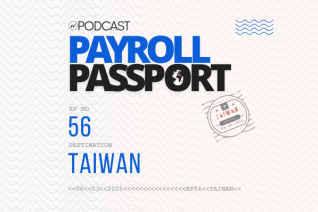Establish your presence globally with Neeyamo as we help you go beyond borders to manage your international payroll and hire new talent in Taiwan.
Overview
Situated in East Asia, Taiwan is a relatively small island nation with complex historical ties to China, leading to limited international recognition—only 13 countries officially recognize it. Despite its size and diplomatic challenges, Taiwan plays a critical role in the global technology landscape, particularly as a hub for semiconductor manufacturing. Its mastery over semiconductor production has positioned it as a linchpin in the intricate machinery of the modern world, exemplifying how a small country can yield substantial influence through technological innovation.
If your organization's expansion plans require hiring employees in Taiwan and you lack a physical entity in the country – a key requisite to hiring local talent – Neeyamo is your way to go. Neeyamo – Global Payroll Services assists organizations worldwide with onboarding and managing employees in Taiwan - processing payroll, managing local compliance requirements, benefits, and more.
Our Presence
Tools And Instances
Facts And Stats
Capital
Taipei
Currency
New Taiwan Dollar (TWD)
Official Language
Taiwanese Mandarin
Fiscal Year
1 January - 31 December
Date Format
YYYY/MM/DD
Country Calling Code
+886
Time Zone
UTC+8.00
Global Payroll
Overview
Handling payroll for a widespread workforce can pose a significant challenge for any organization, and the added complication of compliance can make things worse. If companies spend more time processing payroll, it directly impacts day-to-day operations and their overall productivity. The solution to this problem is – Global Payroll Outsourcing.
Over the years, Neeyamo has observed these complexities and strived to provide a global payroll solution through a single technology platform - Neeyamo Payroll. Neeyamo’s global payroll system eases the process for companies looking to outsource their global payroll requirements and aids them in maneuvering the tricky payroll system in Taiwan. Neeyamo’s payroll software provides the perfect solution for all your global payroll needs – for employees working in primary geographies, the long-tail region, remote or internationally located.
What is a Payroll System?
A payroll system is a software that is used to manage employee payments, inclusive of their wages, deductions, bonuses, etc.
Payroll Taxes
Payroll tax is the percentage amount retained from an employee's salary and paid to the government to invest in the general population's welfare. These are statutory in nature and are levied from both the employer and employee. Additional statutory contributions are made by employers towards aiding both short-term and long-term benefits for their employees.
Employee Taxes
Employee Payroll Contributions
- Labor Insurance - 2.10%
- Employment Insurance - 1.00%
- Health Insurance - 1.551%
- Total Employee Cost - 4.651%
| Up to 560,000 TWD | 5.00% |
| 560,001 TWD - 1,260,000 TWD | 12.00% |
| 1,260,001 TWD - 2,520,000 TWD | 20.00% |
| 2,520,001 TWD - 4,720,000 TWD | 30.00% |
| 4,720,001 TWD and above | 40.00% |
Non Resident Income Tax - Flat rate of 18%
Effective January 1, 2026, the minimum monthly insured salary for both Labor and Occupational Accident Insurance will increase from NT$28,590 to NT$29,500.
- Level 1: Salaries up to NT$29,500 (Contribution base: NT$29,500)
- Level 2: Salaries from NT$29,501 to NT$30,300 (Contribution base: NT$30,300)
Employee Income Tax
Effective January 1, 2026,
Progressive Tax Rate Brackets (Revised Income Thresholds)
|
Net Taxable Income (NTD) |
Tax Rate |
Progressive Difference (NTD) |
|
0 to 610,000 |
5% |
0 |
|
610,001 to 1,380,000 |
12% |
42,700 |
|
1,380,001 to 2,770,000 |
20% |
1,53,100 |
|
2,770,001 to 5,190,000 |
30% |
4,30,100 |
|
5,190,001 and above |
40% |
9,49,100 |
Major Deductions and Exemptions
|
Exemption Type |
New Amount (2026) |
Previous Amount (2024) |
|
Personal Exemption (Most Taxpayers) |
101,000 |
97,000 |
|
Personal Exemption (Age 70+) |
151,500 |
1,45,500 |
|
Standard Deduction (Single Filers) |
136,000 |
1,31,000 |
|
Standard Deduction (Married Filing Jointly) |
2,72,000 |
2,62,000 |
|
Special Deduction for Salary/Wages |
2,27,000 |
2,18,000 |
|
Special Deduction for Disabled Persons |
2,27,000 |
2,18,000 |
|
Special Deduction for Long-Term Care |
180,00 |
120,000 |
Employer Taxes
Employer Payroll Contributions
- Labor Insurance - 7.35%
- Employment Insurance - 1.00%
- Pension Fund - 6.00%
- Health Insurance - 3.102%
- Total Employment Cost - 17.152%
Payroll Cycle
Overview
Undoubtedly, payroll is a critical process for any organization. The pay cycle in Taiwan refers to the period for which an organization pays its employees, and this can vary depending on the pay frequency that the organization chooses to adopt.
Frequency
The payroll cycle in Taiwan is generally monthly, and payments are usually paid on the 15th of each month.
13th Month Cycle
Paying a 13th-month salary is customary in Taiwan and is generally paid during the Lunar New Year.
Global Work
Overview
An Employer of Record service (EOR) provider helps you eliminate the hassle of handling complexities while onboarding a new employee in an international location. They help bridge the gap that otherwise mandates organizations to have a local registered entity and a local bank account prior to making a job offer to an international hire.
An Employer of Record services (EOR) provider acts as a legal employer, facilitates salary payments, and manages other statutory requirements such as health insurance, payroll taxes, and employee benefits, ensuring compliance with local tax laws and regulations.
This allows organizations to focus on collaborating with the employees in Taiwan for operational tasks, with the knowledge that they have a cost-effective solution to support their global business payroll & HR requirements as they continue their global expansion.
HR Mandates and Practices
Minimum Wage
- Effective January 1, 2025, the minimum wage will increase to NT$29,500, up from NT$28,590.
- The hourly minimum wage will increase to NT$196, up from NT$190
Overtime
The first two hours of overtime work must be compensated at one-third (1/3) more than normal pay, while any additional overtime work must be compensated at two-thirds (2/3) more than normal pay.
Overtime work is limited to four hours a day and 54 hours each month, but not more than 138 hours over three months.
An employee who consents to work on a holiday is entitled to double wages. Employees may choose to receive compensatory leave in lieu of overtime pay.
Employers who wish to have female employees work overtime must have the labor union agree to the overtime provisions.
Companies with at least 30 employees are required to report adjustments to employees' overtime hours to local authorities.
Data Retention Policy
Employers must maintain records of the number insured employees, working conditions and work records for at least five years.
Employers must maintain an employee card for each employee and keep these cards for at least five years from the date the worker's employment is terminated. The cards must contain information on the employee's name, sex, date of birth, national identification number, address, dependents, dates of employment, position, working hours, salary and periods of leave without pay.
Hiring and Onboarding Requirements
Hiring
Employers are prohibited from discriminating against any job applicant or employee on the basis of race, class, language, thought, religion, political party, place of origin, place of birth, gender, gender orientation, age, marital status, appearance, facial features, disability, horoscope, blood type or past membership in any labor union.
Onboarding
- Personal details and identification information (e.g., date of birth, nationality, picture, gender, ID card, passport numbers and other national ID numbers as required, immigration status);
- Physical and electronic address details (e.g., private telephone number, private email and/or postal address and business telephone number);
- Education and employment information
- Family information (e.g., marital status, and details of any family or personal relationships)
Probation
There is no standard probation period in Taiwan. Instead, the Act allows employers and employees to negotiate the duration of probation. However, the usual practice is that a three-month trial period is used.
Leave
Public Holidays
There are 15 public holidays per year.
- Jan 1: International New Year
- Jan 30: Little New Year
- Jan. 21 to Jan. 26: Chinese New Year
- Feb 28: Peace Memorial Day
- Apr 4: Children's Day
- Apr 5: Qing Ming Jie
- May 1: Labor Day
- Jun 3: Dragon Boat Festival
- Sep 10: Mid-Autumn Festival
- Sep 28: Confucius’ Birthday / Teachers’ Day
- Oct 10: National Day
- Oct 25: Retrocession/Battle of Guningtou Day
- Dec 25: Constitution Day
Sick Leave
Employers must provide 30 days of sick leave per year paid at 50% of normal wages. Employees are entitled to additional monetary benefits from the Bureau of Labor Insurance. Additionally, employees may take additional unpaid leave after having exhausted their original 30 days of sick leave.
Effective January 1, 2026, the Sick Leave Protections are:
- Protection Limit: Employees taking 10 days or fewer of sick leave per year cannot face "unfavorable treatment" (dismissal or salary cuts).
- Performance Reviews: Employers can no longer use sick leave as the sole reason for a poor performance rating.
Maternity Leave
Employers must provide pregnant employees with eight weeks of paid maternity leave. Pregnant employees who miscarry are granted four weeks of paid maternity leave. The leave must be paid at full wages for employees who have worked more than six months for the same employer, and at half-wages for employees who have worked for less than six months.
Paternity Leave
An employee whose spouse is in labor is entitled to 7 days of paid leave.
- Effective Jan 1, 2026, employees can now apply to use up to 30 days of their existing total parental leave entitlement in single-day increments, rather than being restricted to large, continuous blocks.
- If eligible, both parents may collectively use a maximum of 60 days of this flexible, single-day parental leave per child.
- The government's existing parental leave allowance (80% of salary for up to six months) will remain applicable during the use of these individual single-day absences.
- Effective Jan 1, 2026, employees gain the flexibility to take their annual family care leave in hourly units, up to a maximum of 56 hours per year.
- Once the 56-hour limit is used, employees may utilize any remaining personal leave in hourly units for further caregiving needs.
- Employers must approve these hourly requests and are strictly prohibited from deducting attendance bonuses when this leave is used.
- Parental Leave Flexibility: You may now use up to 30 days of parental leave in single-day increments. Previously, a 30-day minimum was required.
- Hourly Family Care Leave: The annual 7-day Family Care Leave can now be taken in hourly units (up to a total of 56 hours per year).
- Government Subsidy: You will continue to receive 80% of your insured salary from the government for up to six months, including leave taken in single-day units.
- Notice Period: For Planned Leave, you will need to provide at least 5 days' notice.
- Emergencies: For sudden situations (such as a child's illness), 1 day's notice is required.
- Attendance Bonuses: Taking this flexible leave will not affect your eligibility for full-attendance bonuses.
- Small Business Support: To encourage flexibility, the government will provide an NT$1,000 incentive to businesses with fewer than 30 employees for every daily leave application they approve.
Other Leave
Personal Leave - Employees may take up to 14 days per year of unpaid personal leave. Effective January 1, 2026, employees who have exhausted statutory family care leave may now use personal leave to care for family members. And personal leave for family care may be taken on an hourly basis.
* Miscarriage, short-term pregnancy, and sick leave do not reduce the full attendance bonus.
Termination
Termination Process:
The termination process is standard in Taiwan based on the Labour Law requirements, unless an employer can provide sufficient cause for dismissal without notice (due to misconduct, etc.)
Notice of termination must be written and sent to the relevant governmental authorities.
Notice Period:
- employed more than three months but not more than one year: 10 days of notice;
- employed more than one year but not more than three years: 20 days of notice;
- employed more than three years: 30 days of notice
Severance Pay
In Taiwan, severance pay is mandatory when applicable and is determined by the employee’s length of service and the start date of the employment contract.
If the employee’s contract start date is before 2005, the Labour Standards Act requires the calculation of the severance pay to be one month’s salary for each year of employment.
If the employee’s contract start date is after 2005, the Labour Standards Act requires severance pay to be half a month’s salary for each year of employment.
Visa
Taiwan Visa Types
The two main types of visa for Taiwan are:
- Taiwan Visitor Visa (for short stays)
- Taiwan Resident Visa (for long stays)
Taiwan Visitor Visa (for short stays)
The Visitor Visa for Taiwan is for short-term stays of up to 90 days. The Taiwanese Visitor Visa is issued for tourism, social visits, business, attending conferences and events, and other approved purposes that do not require taking up paid employment or obtaining an additional permit.
Taiwan Resident Visa
The Taiwan Resident Visa is for foreigners who wish to live in Taiwan for longer than 90 days for a specific purpose, such as working or studying. As such Taiwan Resident Visas are divided into the following:
- Taiwan Work Visa
- Taiwan Student Visa
- Taiwan Family Reunification Visa
- Taiwan Entrepreneur Visa
- Taiwan Working Holidays Visa
Work Permits
Work permits are issued by the Council of Labour Affairs (CLA) upon request from a Taiwanese employer.
Work permits are valid for up to three years, although an employer can apply for an extension on behalf of an employee, which the employer should submit within four months of the expiration date. When an employee changes employers after arriving in Taiwan, the new employer must apply for a new work permit. In addition, the previous employer must apply to have the original work permit canceled with the Council of Labour Affairs.
When the permit is issued in a foreign country, it must be verified by a representative from a local Taipei Economic and Cultural Office or Taiwan representative office in the country that issued it.
There is an approved list of employment for foreign nationals in Taiwan, including school or foreign-language teachers, specialized or technical experts, a director, executive, or manager of a business set up by or invested in by a foreigner.
Income tax declaration requirements for foreigners:
With effect from April 12, 2023
-
The residence period is determined through the “Certificate of Entry and Exit Date” for foreigners.
-
Foreign employees staying beyond 183 days are obliged to apply progressive rates to their income.
-
Withholding rates are only applied when employees have stayed less than 183 days in Taiwan.
-
Foreign employees with foreign employers would get an exemption of 90 days.
Employee Background Checks
Legal and Background Checks
The employer shall not request that applicants undergo a background check against their will; otherwise, the employer would violate the Employment Service Act and be fined at least T$300,000 but not more than T$1,500,000.
Last updated on February 09, 2026.
If you have any queries or suggestions, reach out to us at irene.jones@neeyamo.com
Have Queries? Get In Touch With Us
Get in touch with one of our experts and take a quick demo of our services










